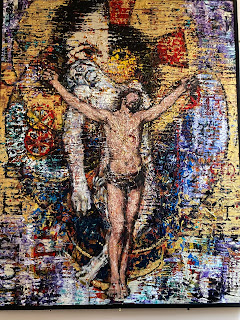Do Justice!
Do Justice
John 4:6-15 (A sermon delivered with Christ Church United Methodist, March 15, 2020)
S.D.G.
Every so often I am asked about what it means to be a member of a church, why it is important. What is the difference between being a member and just coming? It’s a fair question, for everyone is welcome and can participate in most things we do as a church…voting on different things is the one exception.
The difference between attending and being a member of a church is this…intent. With membership, we promise in a very intentional way, to make God and one another a priority in our lives. We promise to care for and love one another in hard and easy times, good times and bad times. We promise to be present to God and each other through worship, service, prayer, and giving faithfully. It is making a promise that these will be an important part of our lives: will you faithfully participate in this congregation, this community, through your prayers, presence, gifts and service.
There is one part of our United Methodist membership/baptismal vows that we don’t talk very much about, the justice part: Do you accept the freedom and power God gives you to resist evil, injustice, and oppression in whatever forms they present themselves? To be Christian, to be part of a church community is to promise to live a life of justice.
Justice is a biblical concept, from Micah 6:8 (the passage that forms our theme for Lent this year-what does God require of you…do justice, love mercy, walk humbly), to Psalm 37, which says, “the Lord loves justice…the mouth of the righteous recite wisdom, their tongues discuss justice”, to Isaiah 59 that says, “the Lord looked and was upset by the absence of justice”, to our story from John today. Justice, standing up for the vulnerable, giving dignity to the forgotten, is close to God’s heart.
Justice is about fairness and equality. It’s about ensuring people have dignity, that no one is seen as “less than” or disregarded as expendable. It is about having laws, policies and practices that are fair and don’t harm or prejudice one group of people over another. It is ensuring that every person can live out their right to life, liberty, and the pursuit of happiness. It is also making sure our pursuit of these things does not prevent someones else from them.
Justice can be controversial to some. Archbishop Dom Helder Camara of Brazil once said, “when I feed the poor they call me a saint, but when I ask why the poor are hungry they call me a communist.” For some justice and politics are too closely tied. Justice can be a hard thing because it calls into question our own lifestyles, habits, and comforts and makes us wrestle with the impact we have on the rest of the world…and that is hard and courageous work. It causes us to be honest about the places where we are privileged and how we must surrender our privileges for others to rise and live. Do you accept the freedom and power God gives you to resist evil, injustice, and oppression in whatever forms they present themselves?
Justice, though, is not simply political…it is theological. It is grounded in God. Justice work comes from a place of seeing people as beloved children of God. It comes from a deep understanding of who God is and how God loves each one of us. Justice is then bringing our ideas, practices, and politics in line with this. Justice says that God is bigger than my ideas, preferences, self-interest, opinions, politics or even beliefs. It is about who God is and how God loves every person.
This story of Jesus and the Samaritan woman at the well is a story about justice. It seems especially appropriate today as we celebrated International Women’s Day this past week. At first glance it seems like an innocent enough conversation between Jesus and a random woman he happens across at a well in Samaria. It is the story beneath the story though that helps us see its power. For one, she was a woman. It would have been seen as beneath a man like Jesus to simply start a conversation with her. She is surprised by it, “Why do you…a Jewish man…ask something from ME…a Samaritan woman.” The disciples were absent in this story, but it says when they returned, they were “shocked” that he was talking to a woman.
She was also a Samaritan, which means she came from a different religious tradition than Jesus. Jewish persons like Jesus did not associate with Samaritans, and vice versa. Jesus’ opponents in chapter 8 will lash out at him calling him a “samaritan” and saying that he “has a demon,” equating the two things. To call someone a Samaritan was an insult. Nobody would have questioned Jesus ignoring or disregarding her. Last, she did not have the best of reputations. She went through husbands quickly and was with a man now who was not her husband. For many, she was a sinner with little claim to holiness. There was a reason she was by herself at the well during the hottest part of the day.
Yet, by being in this type of conversation with her, Jesus is leading this woman to a place of dignity and respect as a beloved child of God. He does not see her as “less than”, but as worthy of life. Even when Jesus mentions that he knows her shortcomings, it is not to shame or embarrass her, but to let her know that he knows her as she is…and still feels she is a person of value. It is a story of justice, Jesus raising the poor and vulnerable to a place of dignity, equality, and worth, this forgotten woman who was an outcast. She is a daughter of God. In so doing this, Jesus critiques every system or cultural norm that would keep her in bondage. Justice!
The business of the Christian is justice. That is why it is part of our baptismal and membership vows. We are to be a people of God’s justice in this world, following in the way of Christ. We are to live differently, speaking out against those practices policies, laws and institutions that tell people they are anything less than children of God.
The enemy of justice is, of course, injustice, but there is also a silent enemy that is equally dangerous…apathy. It is when we go on about our lives unconcerned, blissfully unaware of the suffering and struggles of others. We are too busy, too preoccupied, too self-focused. The Bible won’t stand for that kind of life. “Hate evil, love good, and establish justice at the city gate!” cries the prophet Amos.
How can you better establish justice at the city gate of your life today? What attitudes and practices need to change in you? In what ways to you demean or de-value people, intentionally or unintentionally? How can you best show God’s justice and care in this world?
I want to finish with a litany from our United Methodist Book of Discipline. It is a prayer, declaration, pertaining to justice:
God in the Spirit revealed in Jesus Christ,
calls us by grace
to be renewed in the image of our Creator,
that we may be one
in divine love for the world.
Today is the day
God cares for the integrity of creation,
wills the healing and wholeness of all life,
weeps at the plunder of earth’s goodness.
And so shall we.
Today is the day
God embraces all hues of humanity,
delights in diversity and difference,
favors solidarity transforming strangers into friends.
And so shall we.
Today is the day
God cries with the masses of starving people,
despises growing disparity between rich and poor,
demands justice for workers in the marketplace.
And so shall we.
Today is the day
God deplores violence in our homes and streets,
rebukes the world’s warring madness,
humbles the powerful and lifts up the lowly.
And so shall we.
Today is the day
God calls for nations and peoples to live in peace,
celebrates where justice and mercy embrace,
exults when the wolf grazes with the lamb.
And so shall we.
Today is the day
God brings good news to the poor,
proclaims release to the captives,
gives sight to the blind, and
sets the oppressed free.
And so shall we.
Will you use the freedom and power God gives you to resist evil, injustice and oppression in whatever forms they present themselves? If so, please say, “Amen”.
In the name of the Father, the Son, and the Holy Spirit. Amen.



Comments
Post a Comment